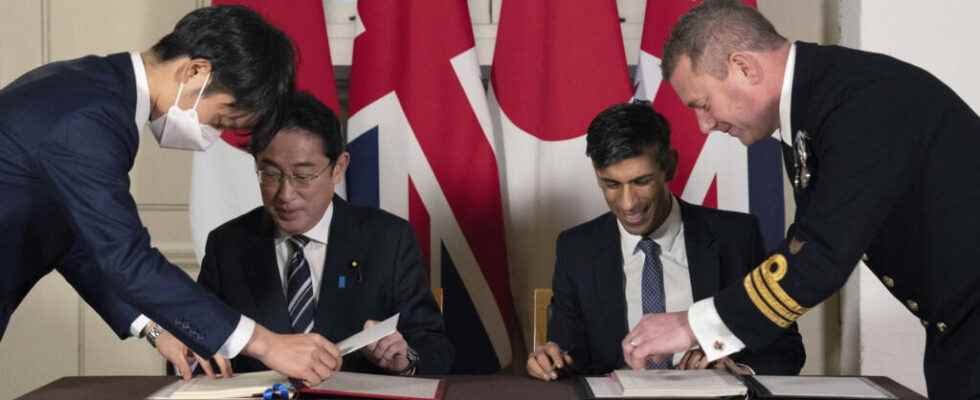British Prime Minister Rishi Sunak was with his Japanese counterpart Fumio Kishida this Wednesday, January 11, at the Tower of London. Both signed a “reciprocal access agreement”, in other words a rapprochement between their armies, in a context of growing Chinese ambitions in the region.
The treaty signed on Wednesday, frowned upon by Beijing, confirms the UK’s growing interest in Asia-Pacific, as does that of Japan in seeking stronger alliances, particularly with China.
Alongside Fumio Kishida, Rishi Sunak extolled the relationships “ stronger than ever between Tokyo and London. ” Not only through trade and security, but also our values. »
And to brag about it the brilliant demonstration last year ”, in reference to the support for Ukraine in the face of the Russian invasion. “ Let’s have a strategic discussion that is our hope Mr. Kishida bounced back.
A shared outlook on the world.
A shared understanding of the challenges we face.
A shared ambition to use our place in the world for good.
Thank you, @Kishida230. It’s great to see UK and Japan working as close as ever ???? pic.twitter.com/raLM65qtuH
—Rishi Sunak (@RishiSunak) January 11, 2023
Reciprocal access
This agreement is the most important in terms of defense between the two countries since 1902. The United Kingdom thus becomes the first European country to have a reciprocal access agreement with Japan.
The text allows the British and Japanese armies to deploy on each other’s territory, and more generally, it establishes a legal framework for their cooperation.
Tokyo had already signed a similar agreement last year with Australia. This strengthening of the military alliance comes in a context of tensions with China, whose regional ambitions are great.
” It is indeed a very important agreement which allows a very advanced collaboration of the armed forces of two different countries which can land on the ground of the other in a conflict situation for example, and then more generally, it can also allow multilateral exercises between partners in the field of defence, and therefore it contributes to the deterrence that its partners in the region can exert “, comments on our antennas Guibourg Delamotte, lecturer in political science at Inalco.
There were exercises before, between Japan and the United Kingdom, they simply took place at sea, and therefore they could not involve the landing of English forces on Japanese soil. For two states working together, it means that cooperation can go much further than when there are simply maritime exercises on the high seas. in the region, therefore would need to land forces in Japan, or even possibly participate in the defense of Japan. We are considering much more advanced cooperation scenarios than when we are simply in a form of military or naval diplomacy, and the nearby navies are conducting very large-scale exercises, but which nevertheless do not involve landings.
Guibourg Delamotte, Japan department of Inalco, on the Tokyo-London agreement
Pre-emptive strikes
On tour in several G7 countries, the Japanese Prime Minister multiplies strategic meetings. After France, Italy, the United Kingdom and Canada, Mr. Kishida will be received Friday at the White House.
Here again, the American press announces an in-depth strategic partnership with Tokyo, Washington’s most important in the Indo-Pacific region, with the main objective of deterrence vis-à-vis China.
In fact, the possibility for the Americans to operate from Japanese soil in a regional logic has long been accepted. In principle, the Japanese government must be consulted and agree to the use of bases in one way or another. But in the case of a missile launch, indeed, you have to proceed very quickly, so that means that probably what will happen is that the United States will be authorized to operate pre-emptive strikes or act freely. In fact, it is confirmed that the United States has all the leeway to act in the context of a conflict around Taiwan…
Guibourg Delamotte, on the Japan-United States relationship
►To re-read: Japan: “We must be part of a balance of power with China”
